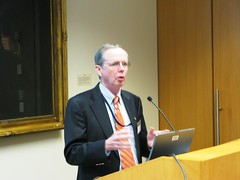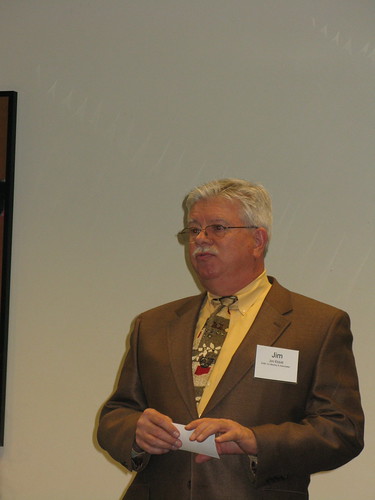ICGFM Promotes Knowledge Transfer Among Public Financial Management Experts
Wednesday, November 5, 2014
Tuesday, October 7, 2014
ICGFM DC Forum - November 5, 2014
Washington, DC 20036
Friday, December 13, 2013
Thursday, September 9, 2010
Jess Ford of GAO on US Government Assistance to Mexico

International Consortium on Government Financial Management (ICGFM) held a luncheon in the Carnegie Mellon Endowment for International Peace on Wednesday, September 8. The speaker was Jess Ford of the Government Accountability Office (GAO) who spoke about United States assistance to Mexico in the ongoing fight against the drug cartels on the Mexico-US border.
The essence of Mr. Ford’s presentation was the management of aid going to the Merida Initiative which is a joint program between the United States and Mexico to combat the threats of drug trafficking, and money laundering on the border. According to Mr. Ford, since 2007 the United States has been ramping up its aid to Mexico and Central America in order to fight drug trafficking. US assistance has been heavy on equipment and technical assistance such as the training of police.
The objective of the aid has also shifted and is now concentrated on judicial reform, human rights and community development. The GAO’s main role has been speeding up the pace of assistance delivery which has been very slow. As of March 2010, only 46 percent of the funds had been released and the program was signed into law in June of 2008.
Some of the difficulties lie in the State Department which has been the overseer of the program. It simply has not had a modern enough system to track the status of the funding and could only track outputs with no outcome measurements or targets. Several other government organizations track the status and data on the program but none of them share a standard language and methodology, further exacerbating the problem.
Another major concern in this effort according to Mr. Ford is the lack of a consistent strategy by Mexico and other Central American countries to combat drug trafficking.
Mr. Ford concluded with his “lesson learned” about the program and its funding. He placed an emphasis on the need to build institutional capacity for the program and properly train personnel.
Wednesday, June 2, 2010
Using Country PFM Systems for AID
Ostermeyer and his team have a plan to develop a new evaluation tool. The process will begin with analysis pilots in five countries beginning with Liberia and moving throughout 2010 to include Rwanda, Pakistan, Nepal, and Peru. Participating pilot countries were chosen based on how innovative the missions are and how well the mission understands and is committed to the Accra accords. The methodology for creating the assessment tool will involve examining what agencies like DFID and the World Bank have done to evaluate or mitigate risk and to build the capacities of country systems at the national level. This assessment tool will be transferrable among countries. It will also support national and sub-national government tiers.
Ostermeyer hopes that this initiative will assist in achieving stronger capacity and sustainability within host countries. This approach will enable the United States to compare host country systems and evaluate which are most ready to take on ownership of aid allocation and spending.
Monday, May 17, 2010
New Methods of Delivering Development Assistance

David Ostermeyer, Chief Financial Officer, US Agency for International Development (USAID), described new methods of delivering development assistance. He objected, somewhat, to the subject of his presentation. Mr. Ostermeyer pointed out that USAID has been looking back to the past to learn what has worked.
Mr. Ostermeyer described that peak in staffing during the Vietnam War, with a gradual reduction since. Budgets peaked in the late 90s. The United States government changed strategy after 2001 recognizing the need for development to create government stability. He pointed out that the United States Congress has become very supportive of international aid. He described the importance of funding countries with high corruption to increase stability.
Mr. Ostermeyer described the efforts to gain unqualified audits and to increase transparency. Transparency has become increasingly important for USAID. He described the changes under the Obama administration, such as procurement reform.
The first priority for USAID is to strengthen country systems. Mr. Ostermeyer pointed out that 56% of USAID funds were implementing through country contract systems. This dropped to 3%. There has been concern about the weakness of host country public financial management (PFM) accountability and the reduction of staff levels. Dictators, in the past, were able to pocket US funds directly. USAID learned that direct contracts for specific purposes had faster results than going through government systems. Auditors found that much of the aid did not reach the intended targets. Hence, USAID became very risk adverse.
Mr. Ostermeyer advocates the Accra Agenda for Action (AAA). He believes that USAID needs to do better in using country systems to improve capacity, reduce transaction costs and enhance participation. USAID is building a strategy for sustainable development. He believes that this requires building institutional capacity and encouraging accountability and transparency. He says that Paragraph 15 of the AAA is the key to USAID. Mr. Ostermeyer suggests that donors have the responsibility to assist countries to improve country systems if those systems do not meet quality and accountability standards. He advocated the PEFA framework but cautioned that some donors believes that these assessments are too high level.
Many country systems are being evaluated by donors and USAID. Mr. Ostermeyer described the process of evaluating Ministries in Pakistan. Rwanda undergoing a PEFA assessment. The number one pilot will be Liberia. DFID has been invited to participate. Mr. Ostermeyer sees USAID doing direct Ministry support, not direct budgetary support in the near future.
David Ostermeyer is Chief Financial Officer at the U. S. Agency for International Development (USAID), a position he was appointed to in October 2007. USAID has been the principal U.S. agency to extend assistance to countries recovering from disaster, trying to escape poverty, and engaging in democratic reforms. Mr. Ostermeyer has worked at USAID for more than 32 years in various financial management capacities.
ICGFM David Ostermeyer Les Nouvelles Methods de Pre Station d'Aide Au Developpement
Jim Ebbitt, President of ICGFM, Opens the 24th Annual Conference in Miami

James Ebbitt, President of the International Consortium on Governmental Financial Management (ICGFM) opened the 24th Annual International Conference in Miami USA. The theme of the conference is "Public Financial Management in the Era of the New Normal." Mr. Ebbitt of Mosley and Associates, said that the greatest benefit of the conference is networking - to share good practices across countries. He emphasized the ICGFM mission of improved global financial management.
Mr. Ebbitt suggested that government budgets are under siege. "The new normal is frightening". He called on financial managers in government around the world to improve fiscal discipline. He believes that the answers that government professionals are looking for may be in the room today. Mr. Ebbitt said that the "new normal" of the post-financial crisis world requires increased transparency and accountability in government.
Mr. Ebbitt is formerly the Acting Inspector General for the U.S. Agency for International Development (USAID) and has worked extensively with Supreme Audit Institutions in foreign countries.
Thursday, October 8, 2009
The Challenges of Realigning US Foreign Assistance with US Foreign Policy Goals
Denise Fantone from the United States Government Accountability Office (GAO) provided a perspective on the American government plan for transitional diplomacy. The F Bureau was created to reform and consolidate State Department and USAID activities and enable performance management.
ICGFM Presentation on State-F Process
Ms. Fantone described lessons learned in culture change in government including the need for workforce management and two-way communications. Documents referenced during the presentation included:
- Foreign Aid Reform: Comprehensive Strategy, Interagency Coordination & Operational Improvements Would Bolster Current Efforts
GAO-09-192 (April 17, 2009) - Foreign Assistance: State Department Foreign Aid Information Systems Have Improved Change Management Practices but Do Not Follow Risk Management Best Practices
GAO-09-52R (November 21, 2008) - Delegation of Authorities to the Director of Foreign Assistance
GAO B-316655 (October 29, 2008)
Friday, August 7, 2009
The Energy Challenges Facing Governments Around the World
DC Forum
September 2, 2009, Carnegie Endowment, (Washington, DC)
The Energy Challenges Facing Governments Around the World
Whether an energy importer or an energy exporter, the problems of volatility, supply, and sustainability are creating unprecedented challenges for governments in managing economic growth, public finance, and the environment. Our panel will present the challenges and how governments are responding.
Our panel will include Ms. Deborah Bleviss, a consultant in sustainable energy to a wide range of governments, and Mr. Michael Curtis, a senior USAID official focused on the impact of energy in the developing world. This discussion will focus on:
- Barriers to growth posed by energy shortages
- Impact of energy on poverty reduction
- Sustainable energy policies being implemented around the world
- Revenue and expenditure impact on public finance from energy price volatility
- Short-term and long-term energy challenges






